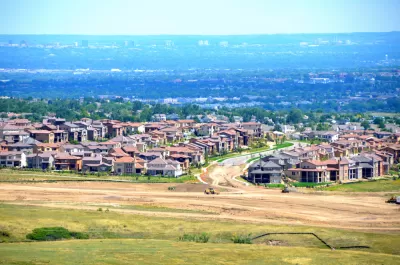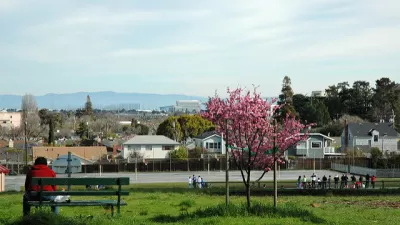In a scathing response to arguments in favor of a "slow growth" ordinance in Lakewood, Colorado, Mike Eliason rebukes the idea that capping growth is a green policy.

The city of Lakewood, Colorado recently made waves by approving strict caps on residential development, a policy some environmental activists supported. "To anyone who has been paying attention to the housing crisis across the country, the outcomes of such an act will be quite obvious," Mike Eliason writes. "Home values will continue to escalate, affordability will not improve, rents will go up, commutes will get longer, homelessness will increase."
In addition to the policy's potential social and economic pitfalls, Eliason says it's preposterous to view "slow growth" measures as environmentally friendly. He writes, "the cap does not apply to business and commercial properties. What this means is that the city can continue to add jobs at a staggering clip, but the housing that should be added to balance those jobs in the city, will be forced to be located outside the city."
Eliason ridicules the idea that "forcing 4,000 more people to drive into the city for work, life, sports, school" can constitute a plan for climate action. "In fact, it is the exact opposite of a climate action plan, and here is why. Lakewood's own 2015 carbon emissions inventory shows that as it has gotten denser, its carbon footprint has actually gotten smaller."
Calling Lakewood's anti-development policies "a form of climate arson," Eliason also points out that they can be racially and economically discriminatory, foisting the burdens of auto-centric sprawl on youth, the poor, and people of color while preserving the benefits for well-off mostly-white homeowners.
FULL STORY: A growth cap is Climate Arson

Alabama: Trump Terminates Settlements for Black Communities Harmed By Raw Sewage
Trump deemed the landmark civil rights agreement “illegal DEI and environmental justice policy.”

Planetizen Federal Action Tracker
A weekly monitor of how Trump’s orders and actions are impacting planners and planning in America.

The 120 Year Old Tiny Home Villages That Sheltered San Francisco’s Earthquake Refugees
More than a century ago, San Francisco mobilized to house thousands of residents displaced by the 1906 earthquake. Could their strategy offer a model for the present?

Ken Jennings Launches Transit Web Series
The Jeopardy champ wants you to ride public transit.

BLM To Rescind Public Lands Rule
The change will downgrade conservation, once again putting federal land at risk for mining and other extractive uses.

Indy Neighborhood Group Builds Temporary Multi-Use Path
Community members, aided in part by funding from the city, repurposed a vehicle lane to create a protected bike and pedestrian path for the summer season.
Urban Design for Planners 1: Software Tools
This six-course series explores essential urban design concepts using open source software and equips planners with the tools they need to participate fully in the urban design process.
Planning for Universal Design
Learn the tools for implementing Universal Design in planning regulations.
Clanton & Associates, Inc.
Jessamine County Fiscal Court
Institute for Housing and Urban Development Studies (IHS)
City of Grandview
Harvard GSD Executive Education
Toledo-Lucas County Plan Commissions
Salt Lake City
NYU Wagner Graduate School of Public Service




























